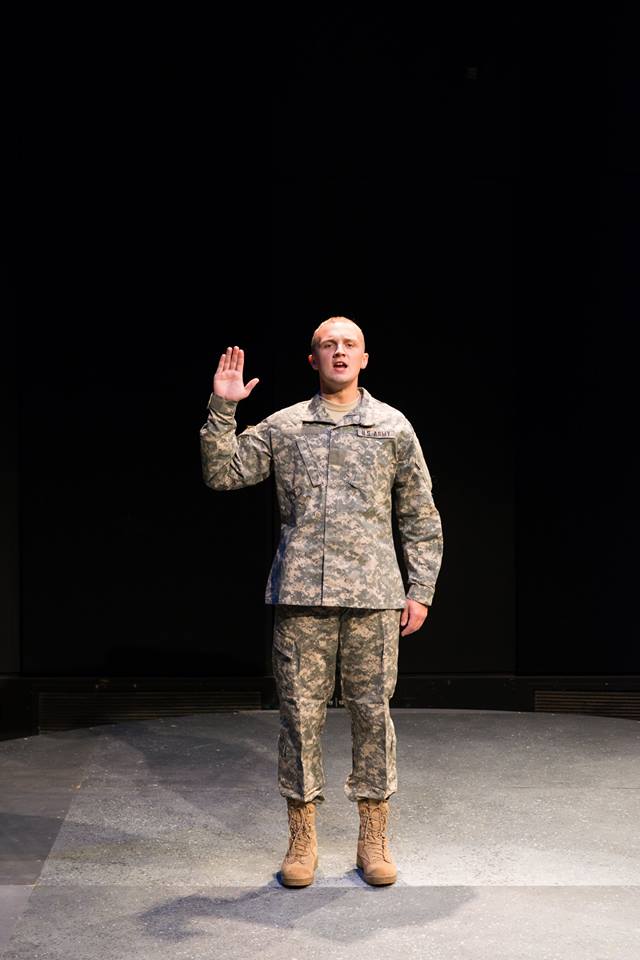OGDEN—Through the first three scenes of Weber State’s 9 Circles, I sat dreading the negative review I’d have to write. This script could be a winner, I thought, but the rigid, almost robotic delivery of the text was killing it, line by line. Even taking into consideration the speech pattern of military personnel, and the technical jargon of a lawyer/attorney, I could not justify the loud, overly annunciated recitation of each sentence by all four of the actors. But thankfully, the heavens opened and the lead actor became a regular (albeit mentally disturbed) human being, and his cast mates followed suit. Once the acting had improved, I could see the production for what it was: a beautifully executed play about a horrible circumstance.

Bill Cain’s script is clever, uncomfortable, and riveting. This modern-day play on Dante’s Divine Comedy, with its 9 circles of Hell, was a great framework for this plot of a U.S. soldier descending into condemnation as a war criminal. And there were enough questions about the event that I went back and forth in my feelings toward him. The soldier’s name was Daniel E. Reeves, and there were times I felt bad for him, even knowing the atrocities he’d committed. In his closing monologue, he ironically began with, “I’ve had a good life.” Of Cain’s many great lines, I most appreciated, “If I wake up and there’s sand, I’ll know I’m in hell.”
The stage where this story is told was a raised circle, slanted toward the audience. Metal bars erected in strategic places created the feeling of imprisonment, and when lit, these bars created a crisscross onstage. Two ensemble members, Kaitlyn Hipwell and Colin Doxey, dressed as guards, sat stage right and left to keep watch over the Reeves, and conveniently changed set pieces as well: a table and chairs, a prison cot. One set confused me, as Daniel was strapped into a large wooden chair and I mistakenly thought that Daniel was about to be electrocuted, based on the set, the sound, the lighting. Set Designer Van Tinkham’s tilted stage worked well as a small confined space, but also created the impression of distance from back to front, high to low. I liked how each scene left a memento onstage, and each was lit individually.

Besides Cory Thompson, who played Daniel, the other three characters played multiple roles. I’ve mentioned that none of them embodied their first part. Patrick Kibbie improved a bit as he next played the Pastor, who shares his version of Jesus Christ with Daniel. It wasn’t a strong role, but he had his moments. The costume that Erin Carignan chose for Kibbie included a comforting cardigan, and it was just right in the way it stood out amongst the uniforms and suits. Flo Bravo nailed her second role as the Shrink, speaking with passion and empathy. I had a hard time believing she was a therapist when she paced around the stage, but while sitting, and especially while coming down to Daniel’s level, as a parent would, I truly enjoyed her. And she absolutely kicked butt as the Prosecution in her black heels. Christian Johnston was a great Defense, and nearly swayed me with his convincing argument. Physically, I believed the motivation for all his movements and staging.
I’m so glad that Cory Thompson’s slow start wore off; he made up for it ten-fold. As Daniel E. Reeves, Thompson never left the stage. He was the drama, the comic relief, and the vulnerable 19-year-old with the unsettling laugh. I absolutely believed this character could have hurt someone, based on his physical strength and unpredictable personality, and I believed the sad conditions he’d grown up in. In the final scenes/circles he commanded the stage, and the way Director Tracy Callahan staged the ending, along with William Peterson’s lighting (with Arabic text written in red), and Jess Greenberg’s sound, I was left with permanent and powerful images in my mind.
I was disappointed initially by the acting and direction, but this production soon earned my attention. Weber State impresses me again and again with their design and technical elements, and this time was no exception. By the end of this 90-minute play, I admired the actors, and most of all Cory Thompson. What a challenging role to fill in such a significant story; and so much sadness and strength he delivered.
[box type=”shadow”]9 Circles is playing at Weber State University in the Eccles theatre, through November 21st. Tickets are $10-$12. More information can be found at weber.edu[/box]

